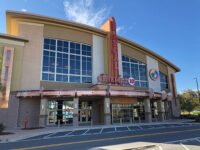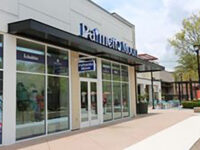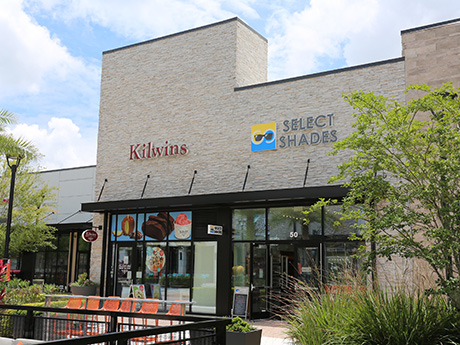Brokers and developers say the region, where retail is outperforming expectations, offers a warm embrace and opportunity for residents and retailers alike.
Skies aren’t the only thing that are sunny in North Florida as the region’s retail market is exceeding expectations and defying macroeconomic headwinds. Michael McNaughton, chief operating officer at Sleiman — a shopping center owner and developer based in Jacksonville — says that the region’s outlook is “extremely bright” heading into the new year.
Though not without their challenges, recent months have seen strong property-level performance of retail in the North Florida market, headlined by Jacksonville and Gainesville, a point on which there seems to be a general consensus. According to McNaughton, 2022 was “a banner year” for Sleiman.
“Our occupancy levels have achieved 2007-like occupancies, and we’re very excited,” says McNaughton.
Jason Ryals, an executive director of Colliers’ Jacksonville office, echoes this positivity. As he puts it, “everybody has been waiting for this slowdown, but as soon as you get a vacancy, the phone rings off the hook and you get three or four letters of interest almost immediately.”
Another common talking point among the industry professionals interviewed for this article centers on the population growth in Florida and its desirability as a locale for both residency and business. McNaughton points out Florida’s lack of state income tax and pleasant climate year-round as two significant draws.
“As long as those two things remain the same, Florida will continue to be an attractive alternative to other areas of the country,” says McNaughton.
Deborah Butler, president of Gainesville-based Butler Enterprises, observes that “so many good people and companies” are moving to Florida and that “retailers love and appreciate the market.”
Ryals also references the “sheer number of people continuing to move” to the area as one reason for optimism for the retail market’s prospects.
According to the United States Census Bureau, Florida was the country’s fastest growing state in 2022, in addition to being the third most populous. It’s the first time the Sunshine State led the country in population growth since the 1950s. Florida’s population increased by 1.9 percent between 2021 and 2022, reaching 22.2 million people.
Colliers’ third-quarter Jacksonville retail market numbers offer substantiation of the favorable sentiment shared by brokers and developers. Vacancy in the third quarter sat below 4 percent, with “market rents growing at a record pace,” according to the report.
Asking triple-net lease rates increased to $17.54 per square foot as well. This is up from $16.21 in the first quarter of 2022. Asking rates in the third quarter of 2021 were at $15.68 per square foot according to Colliers, marking a year-over-year increase of 12 percent.
Vacancy, at 3.7 percent, has dipped to what Ryals calls a “record low.” For comparison, the vacancy rate in the third quarter of 2021 was reported by Colliers as 4.1 percent.
A Scramble for Space
A lack of new supply is at least partly responsible for these strong fundamentals, including the low vacancy rate. CBRE’s U.S. Real Estate Market Outlook 2023, published in December, shares that nationally, “retail deliveries have reached record lows over the past three years.”
Within this context, a fierce competition for space has ensued among retailers. One of the ways tenants navigate this, according to Ryals, is by “stretching on deal terms.” This can be in the form of fewer tenant improvement (TI) dollars or, more simply, higher rent.
Higher occupancy has also afforded landlords a great deal of leverage and an ability to be selective when renting out space, favoring qualities such as high credit and brand recognition.
“Sometimes tenants don’t even have a shot because there’s a [tenant with a] better name or better credit that’s ahead of them,” says Ryals. “Even if you made a better economic deal to the landlord, the landlord wants the other tenant.”
Challenges
Another factor in the lack of inventory and consequent competition for space in North Florida is that of the current cost of development. High construction costs, aside from restricting new development, can also influence rent increases in other ways.
Ryals points out that landlords may feel the need to raise rents in order to justify the higher construction costs.
Development in recent months has also been somewhat stymied — if not altogether prevented — by supply chain delays. Though now “improving dramatically,” according to McNaughton, these delays made obtaining necessary items such as electrical components exceedingly difficult, with lead times of around 40 to 60 weeks.
This has necessarily altered delivery timelines for developments and redevelopments. Of course, this struggle has not been limited to North Florida. As McNaughton points out, tenants are “running into this nationwide.”

Regal Cinemas is one of the anchors at Celebration Pointe.
Butler Enterprises similarly faced the difficulty of acquiring HVAC supplies. Solutions included drawing on Butler’s network to find new suppliers and loaning equipment. Of the latter, Butler says that it is “important to have some supplies on hand and save things on property when old tenants move out,” for times such as these.
Another challenge shared by retailers, regardless of region, is that of rising costs of operations, inflation-driven and otherwise. Ryals points out that obtaining product from manufacturers is more expensive, as is hiring employees.
Butler has observed several retail tenants face the challenge of figuring out “how to adjust their building or interiors to reduce costs,” while avoiding allowing such changes to impact their brands.
Economic headwinds such as the runup in interest rates have also slowed investment sales to a degree. Even so, some deals are still transacting, despite the capital markets challenges.

Celebration Pointe is anchored by Regal Cinemas and Bass Pro Shops. Tenants also include Nike Factory, Starbucks, Escapology, Tommy Hilfiger and Tioga Dental.
Notable Happenings
One such deal featured the sale of Sawgrass Village, a 143,833-square-foot shopping center located in Ponte Vedra Beach, just outside of Jacksonville, for $82 million. Lakeland, Florida-based Publix Super Markets purchased the property in a Colliers-
brokered transaction.
In October, JLL brokered the sale of a retail center that, at 142,767 square feet, is similarly sized. An affiliate of Atlanta-based RCG Ventures LLC sold the property to an undisclosed seller.
Leasing activity, as suggested by the low vacancy rate, has persisted in a big way as well despite higher capital expenditures for retailers.
At Butler’s developments — a trio of contiguous shopping centers along I-75 and Archer Road in Gainesville that include Butler Town Center, Butler North and Butler Plaza — recent openings have included Nothing Bundt Cakes, Foxtail Coffee Co., Southern Tide, Kendra Scott, Fords Garage, Koto Hibachi, Hopdaddy Burger Bar, Avecina, Tyummi, Burlington, Sleep Number, 511 Tactical, Rock N Roll Sushi and Uniform Destination, all of which Deborah Butler says “are doing well.” Aerie, an intimate apparel brand owned by American Eagle Outfitters, has also signed a lease, with the store scheduled to open this year.
In December, Texas-based boot company Tecovas opened a store at St. Johns Town Center, an open-air mall owned by Simon Property Group in Jacksonville, where this year will also see the arrival of stores including Gucci, J. Crew Factory and Modani Furniture.
Meanwhile, McNaughton notes that Sleiman just transacted on a 6.5-acre site for Jacksonville’s first flagship Tesla dealership and service center at the owner’s Atlantic North project.
HomeSense will also make its Jacksonville debut, according to a recent announcement cited by Ryals, who also notes that Phase II of Durbin Park — a 400,000-square-foot power retail center — will soon be available for leasing, with the groundbreaking projected for 2024.
Developments such as Durbin Park have not halted either, even in the face of supply chain delays and higher costs to build. Work continues on Celebration Pointe, a mixed-use project in Gainesville. Comprising 1.5 million square feet, the development is owned by Celebration Pointe Holdings LLC and is the vision of Svein Dkyrkolbotn, principal owner of Viking Cos., as well as Ralph Conti, owner of Ra Co Real Estate Advisors.
Anchors of Phase I of the project include Regal Cinemas and Bass Pro Shops, with other retailers including Tommy Hilfiger, Nike Factory, Starbucks, Escapology and Tioga Dental. Dkyrkolbotn reports that 50 percent of the overall development is open and operating.
Currently, the ownership group is preparing for the soft opening in January of the Alachua County Sports Complex, the 142,000-square-foot sports and events center component of Celebration Pointe, which is sanctioned by the NCAA. Following track season, the complex, the highlight of the development’s second phase, will shut down in order for the surfacing of the courts to be completed.
According to Dkyrkolbotn, the complex is acting as an anchor within the development, driving substantial retailer interest. This includes a great deal of the food-and-beverage variety, which Dkyrkolbotn also attributes to the sports complex and entertainment-based nature of the development.
“We’ve had a lot of interest from food-and-beverage because of the amount of people who are going to come in around the sports event center,” says Dkyrkolbotn. He shares that these include some higher end dining options, such as Spurriers and Prime and Pearl, adding that there will be a great deal “of people coming in on the weekends, and during the week there’s a big tourism in place for the events center.”
Restaurant openings continue in earnest in Jacksonville as well, with new-to-market concepts including SoNapa Grille, Pie95 Pizza and Purple Roots, a Filipino eatery.
Trends
Reflecting on tenant trends at Sleiman’s shopping centers, which are predominantly grocery-anchored, McNaughton too makes mention of food-and-beverage activity. More specifically, McNaughton has seen a trend toward “more convenient, smaller food operators, as opposed to full-service, sit-down restaurants.”
Medical users, as highlighted in the Colliers third quarter report, are highly active in retail centers. This is not, as Ryals points out, a new trend, but rather one that has been prevalent for years. He explains that the current media landscape voids many types of advertisement that medical tenants may have adopted in the past.
“People don’t read the newspaper anymore, so you can’t advertise in the newspaper, and people don’t watch commercials anymore,” says Ryals. Therefore, he says it is prudent to occupy retail centers and spaces with good traffic and visibility.
“Medical users realized 10 or 15 years ago that if they’re on a main corridor with 40,000 cars a day on it, they don’t have to advertise because there’s brand recognition from being up front,” Ryals continues. “A chiropractic group has to buy the old Pier 1 and put a chiropractic office in the building,” he says, by way of example.
In a similar vein, McNaughton has observed a move away from apparel-based retail in favor of a category he terms “personal care.” He elaborates that “fitness, hair, nails, barber shops, classroom instruction and so forth are big drivers.”
Looking Forward
Brokers and developers in North Florida are optimistic for the outlook of the retail market moving into 2023. They do temper this optimism with an awareness of the current economic headwinds and the effects that will manifest this year.
Ryals believes that there will be some slowing. “It is going to be more expensive in general to run a business, so we will see a little bit of a slowdown,” Ryals explains. However, he does not anticipate any such regression to be significant.

Foxtail Coffee recently opened at Butler Plaza in Gainesville.
McNaughton believes that though Sleiman expects another great year in 2023, perhaps as good as 2022, participants of the retail scene will need to be more thoughtful and skillful as they navigate the market’s realities.
“This new environment will require a bit more responsibility and ingenuity toward money-making opportunities as they arise and the ability to recognize those opportunities in an environment where costs are different,” says McNaughton. “We’re not able to just rely on the tailwinds of a market and believe that every idea works.”
Butler too says the onus is on owners, developers and operators to create their own success. Her philosophy? Strong performance comes from “being the best you can be, working hard every day and never taking your property, your tenants or the market for granted.”
—Hayden Spiess
This article was originally published in the January 2023 issue of Shopping Center Business magazine.


